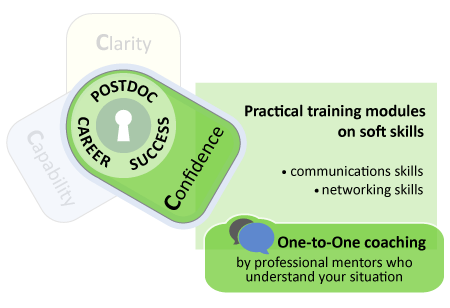PostdocTraining free training tools - Part 3: Confidence
Does confidence matter?
Let's assume you have Clarity about your career direction and you are working on your Capability. Why is Confidence the 3rd target of the PostdocTraining method?
The simple answer is, because confidence means everything when it comes to career success. When you are confident, you are so much better at dealing with the set-backs - funding applications declined, scooped results, papers rejected - that are part and parcel of working in research.

Confidence-busting rejections are unfortunately a big part of a researcher's life
Confidence makes it so much easier to ask for opportunities you deserve, to take on new challenges, increase your skills and reach, and - most importantly - actually enjoy what you do.
Unfortunately working in research is, in the main, not great for confidence. Rejections of grant applications and papers, red pen on your manuscripts, fierce competition for jobs and the isolation of working on your own or in a group where everyone competes against each other, are all part of the territory.
Also, postdocs often receive little personal guidance and career support; so how can you be confident that you are taking the right actions and are moving in the right direction?
Building confidence in a testing environment
One of the best ways to develop your confidence is to enlist mentors to encourage you, and provide you with advice and guidance you can trust.
First, let's clear up one of the myths about finding great mentors. There's a prevailing misconception that you need to find 'the one' mentor that helps you solve all your problems - like a 'Fairy Godmother' who answers all your questions, helps with your break-through papers, introduces you to all the networks you need, etc..
'Fairy Godmother' mentors do occasionally materialise for emerging researchers, but they are rarer than hen's teeth!
It is much more common to receive advice and support from a variety of different mentors over time: a mentoring 'team'.
Many of the researchers we work with confirm their supervisors are great for guidance on particular manuscripts or techniques, but are rarely strong mentors when it comes to practical, up-to-date and unbiased career advice. These postdocs use PostdocTraining for mentoring support on career direction and building the confidence and capabilities to take the necessary steps.
So, how do you set up your own team of mentors and make sure you 'recruit' the right people?
Following the steps below will help you identify in what areas you actually need support, and generate ideas for potential mentors to help with your particular challenges.

Your mentoring team: mentors with different roles to help you navigate a tough environment
Establishing your own mentoring team
1. Take 20 minutes to list all the questions you currently have about your career. These can vary from the strategic to the day-to-day, such as:
- what career direction should I take, based on my strengths and preferences?
- what do I need to do to secure my next position or get started with finding my own funding?
- who should I connect with to build an effective career network?
- how do I manage this difficult relationship at work?
- how do I get my manuscript X into a higher impact journal?
Have another look at our '7 Keys' report and your self-assessment as a reminder of areas where you may need support.
2. Make a second column next to your questions and put beside each question the names of people who may know the answer and are likely to support you. (It's very probable you will be able to put different names down against different questions, so you don't actually need one 'Fairy Godmother' who can help you with everything.)
3. Now you can start contacting individuals about helping you with these questions. Voila! - you have the makings of your mentoring team.
The advantage of the 'mentoring team' approach is that it puts you in the driving seat. Instead of waiting for the 'Fairy Godmother or -father' to reveal herself or himself, you can be pro-active about approaching the people you think would be best suited to help you with particular challenges. Such people are generally also even happier to help, if they know they won't be the sole person responsible for providing you with mentoring support.

Overview of how the Postdoc Career Success Program aims to build confidence
A key step to increasing confidence is to realise that you do not have to 'go it alone'.
To find out more about how to get support for building your confidence and tackling all your key career-related issues, click on the button below:
